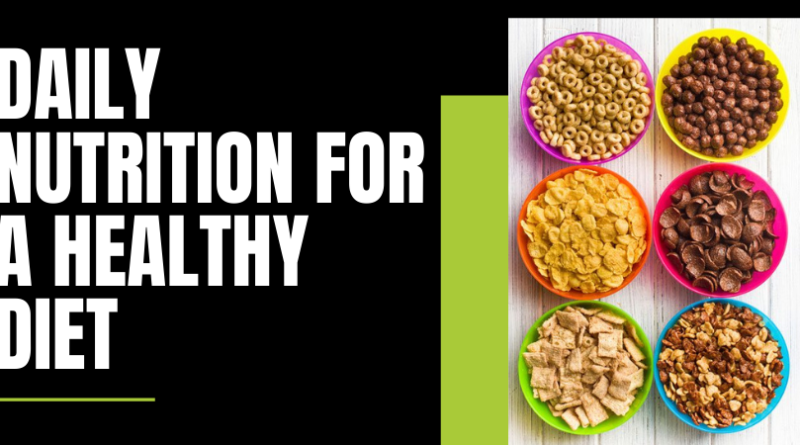Daily Nutrients For A Healthy Diet
Every adult needs a recommended daily nutrition intake to maintain good health. A balanced diet for an average adult consists of the following 6 major nutrients daily. They are protein, carbohydrates, fat, sugars, sodium (salt), and dietary fiber.
1. Protein
Proteins are the building blocks for our blood, muscles, cartilage, skin, and bones. They are used in the production of important enzymes, vitamins, and hormones crucial for our health. It normalizes our blood sugars, keeps us alert, and increases satiety so we do not over-eat.
There are many sources of proteins around us. They are readily available in the foods we buy in the supermarkets such as diary, nuts, soy products, and meats. If you are looking for healthier options, go for non-meaty alternatives such as nuts and soy proteins. If you have to go for meat proteins, lean pork, chicken, beef, and fish provide rich and healthy sources of proteins you need.
2. Carbohydrates
Carbohydrates are an important source of energy and fuel for muscle and brain functions. They contain other vital minerals, vitamins, fiber, phytochemicals, and antioxidants. These essential nutrients support immunity and protect us from diseases. Grains, vegetables, and fruits are great sources of carbohydrates. Not all carbs are bad, taking healthy carb at a limited level will really boost your nutrition. If you need a supplement to support your daily nutrition. Goli ACV Gummies can be an easy and convenient way to support your nutrition.
3. Fat
Not all fat is bad and vice versa. Healthy fat, such as monounsaturated, polyunsaturated, and omega-3 fatty acids is a good and healthy fat. We recommend taking these for health reasons. They provide energy and the essential fatty acids to enhance your skin health and complexion, vitamin absorption, and brain development. Healthy fat can also protect your heart against coronary artery disease and lower blood pressure as well as bad cholesterols such as triglycerides and LDL.
Such good fats can be found in fish, oils including fish oils, olives, avocados, and nuts. Bad and unhealthy fats are best avoided. They are trans fats, saturated fats, and hydrogenated fats. These often raise cholesterol levels and trigger heart diseases. Such fats are found in pork, beef and chicken fat, milk fat, and butter. Junk food such as chips and desserts like ice cream are also poor choices. If you have to eat them, it’s advisable to eat them in moderation.
4. Sugars
Sugar has a bad reputation for being the cause of many modern-day diseases. But did you know that our body cannot function without sugar? It has its key role to play in our daily diet through excessive intake almost always results in dire health problems like diabetes and heart diseases.
Sugar provides the energy for our muscles to function. It is also a source of energy for our brain and nervous system. It metabolizes fats and prevents our body from cannibalizing protein for fuel. Blood sugar or blood glucose is broken down to create energy to fuel our body cells.
Sugar comes in 2 forms, natural and added sugar. Natural sugars include glucose, sucrose, and fructose and they come from fruits and vegetables. Added sugars on the other hand are found in soft drinks, juices, refined sugar or processed sugar, cakes, pies, dairy products, yogurt, ice cream, and other processed foods.
According to FDA, based on a review of current scientific data (also used for the 2015 Dietary Guidelines for Americans Advisory Group), they propose a daily maximum sugar intake of 10% of daily calories consumed.
For example, the daily sugar intake recommended for an adult consuming 2000 calories is 200 calories per day.
Using the “Divide By 4” rule, divide the number of calories by 4 and you get the maximum number of grams of sugar to take. Using the example, 200 calories divided by 4 equals to 50 grams of sugar
5. Dietary Fiber
Dietary fiber is the indigestible portion of food from plants, Dietary fiber has 2 components, soluble fiber, and insoluble fiber. Soluble fiber dissolves in water and is readily fermented in the colon into gases and active byproducts. Soluble fiber, once dissolved, becomes gel-like or viscous and promotes the removal of fatty substances like cholesterol, and regulates the body’s use of sugars. It lowers the LDL cholesterol levels in our bodies.
Insoluble fiber on the other hand adds bulk and softness to stools. This promotes bowel movements, which get rid of waste from the body and promotes a good digestive system.
6. Sodium
Salt is not all bad. A little salt is still needed in our daily diet intake to help our body function properly. Salt ensures water retention in our body which is important for the transportation of nutrients. Another function of salt is it helps muscle contraction. Salt also contains nutrients crucial for our stomach.


[…] values, culture, and experiences. Nutrition is a topic that allows you to investigate the impact of diet and nutrients on your physical health. Nutrition can help you understand how your emotions, sentiments, motivations, values, and […]